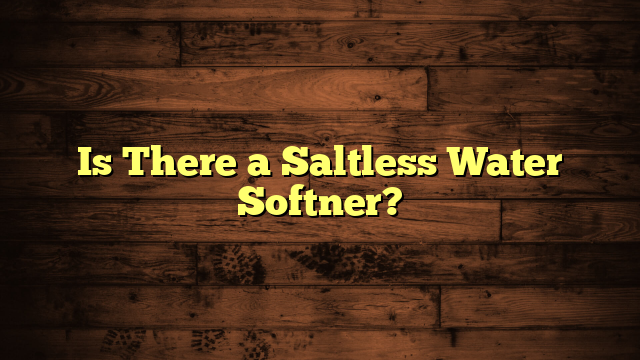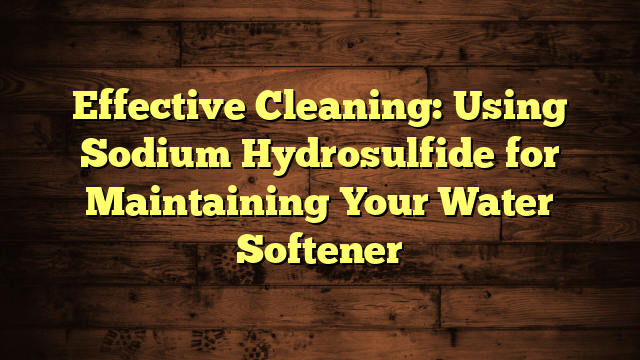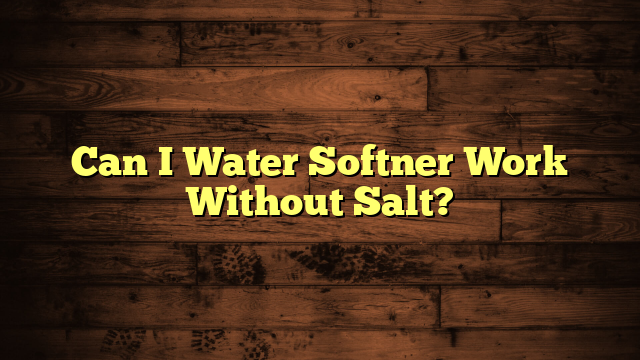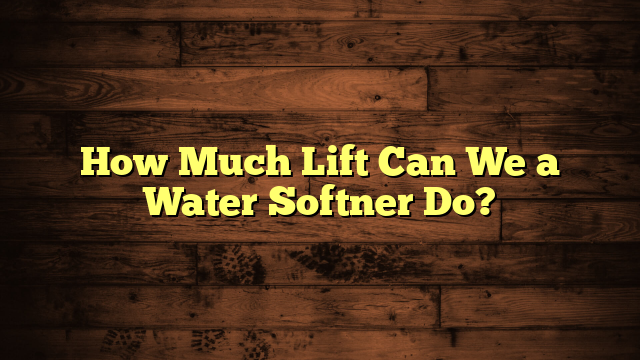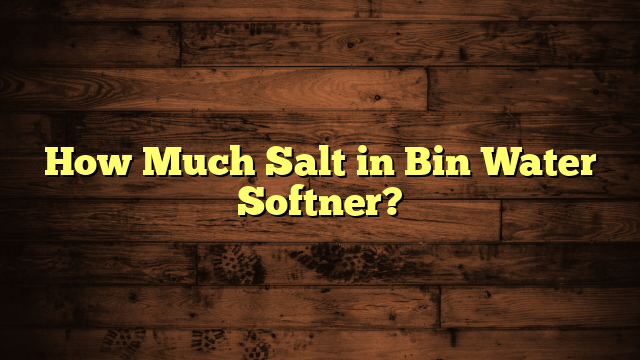Is There a Saltless Water Softner?
Yes, there are saltless water softeners that offer an effective solution for managing hard water without the use of sodium. These systems utilize technologies like template-assisted crystallization and magnetic conditioning to alter hard minerals, preventing limescale buildup without removing essential minerals. They're easy to maintain and environmentally friendly, as they minimize water waste and reduce chemical reliance. While their effectiveness can vary based on water hardness levels, many users report softer skin and shinier hair after installation. If you're curious about the specifics of each type and how to choose the right one, you'll find more insights useful.
Key Takeaways
- Yes, saltless water softeners exist and use technology to manage hard water without the addition of salt.
- They employ methods like template-assisted crystallization and magnetic conditioning to reduce scale buildup.
- Saltless systems require minimal maintenance and do not need regular salt refills.
- These systems can improve water quality while retaining essential minerals beneficial for health.
- They are environmentally friendly, avoiding excess salt discharge into the water supply.
Understanding Hard Water
Hard water can be a frustrating challenge for many households. You might notice that your dishes come out of the dishwasher with spots, or your clothes feel stiff after washing. These are just a couple of hard water effects you can encounter. Hard water contains high levels of minerals, such as calcium and magnesium, which can lead to mineral buildup in your pipes and appliances.
Over time, this buildup can restrict water flow and reduce the efficiency of your water heater, dishwasher, and washing machine. You may even find that your soap doesn't lather as well or that your skin feels dry after showering.
These everyday inconveniences can greatly impact your home's overall functionality and your family's comfort.
Understanding hard water is essential for finding solutions to these issues. By recognizing the signs and effects of hard water, you can take proactive steps to mitigate its impact.
Whether you're considering treatments or simply adjusting your cleaning habits, knowing how hard water affects your daily life empowers you to make informed decisions. Staying informed about hard water can ultimately lead to a more comfortable living environment for you and your family.
Traditional Water Softeners
For many homeowners, traditional water softeners have been the go-to solution for combating hard water issues. These systems primarily use ion exchange, a process that effectively removes minerals like calcium and magnesium from your water. By replacing these hard minerals with sodium ions, traditional methods help prevent scale buildup in your plumbing and appliances, extending their lifespan and improving water quality.
When you install a traditional water softener, it typically consists of a mineral tank and a brine tank. The mineral tank is where the ion exchange occurs, while the brine tank holds the salt used in the regeneration process. You'll need to refill the brine tank periodically to guarantee the softener operates efficiently.
While traditional water softeners are effective, they do require some maintenance, including regular salt additions and occasional cleaning. It's crucial to monitor your system to guarantee peak performance.
What Is a Saltless Softener?
A saltless water softener offers an alternative approach to managing hard water without the use of traditional salt-based methods. Instead of relying on sodium ions, these systems utilize salt-free technology to reduce scale buildup in your plumbing and appliances. This is achieved through a process called ion exchange, where hard minerals like calcium and magnesium are transformed into a more soluble state.
You might wonder how this works. Saltless softeners employ a special media that alters the structure of hard minerals, preventing them from adhering to surfaces. This means you won't have to deal with limescale deposits on your faucets, showerheads, or inside your water heater.
Plus, there's no need to regularly add salt or monitor salt levels, making maintenance much simpler.
In addition to being convenient, saltless water softeners are also environmentally friendly. They don't discharge excess salt into the water supply, which can be detrimental to the ecosystem.
If you're looking for a hassle-free way to address hard water issues while being mindful of the environment, a saltless softener might be the solution you need.
Types of Saltless Water Softeners
Exploring the types of saltless water softeners can help you find the right solution for your home. One popular option is magnetic conditioners. These devices use magnets to alter the properties of hard water minerals, preventing them from forming scale in your pipes and appliances.
They're easy to install and require minimal maintenance, making them a convenient choice for many homeowners.
Another effective type is template systems. Unlike traditional softeners, template systems utilize a special media that encourages hard minerals to crystallize, which keeps them suspended in the water rather than allowing them to accumulate as scale.
This method doesn't remove minerals but transforms them into a more manageable form, making it a great alternative if you want to maintain some mineral content in your water.
Both magnetic conditioners and template systems have their unique advantages and can notably improve your water quality without the use of salt.
When selecting the right option, think about your specific needs, maintenance preferences, and budget. Understanding these types will empower you to make an informed decision that suits your lifestyle and home requirements.
Effectiveness of Saltless Options
How effective are saltless water softeners in tackling hard water issues?
Saltless technology utilizes various methods to reduce the negative effects of hard water without using traditional salt. These systems often employ water filtration techniques like template-assisted crystallization or electromagnetic waves to alter the properties of minerals, preventing them from causing scale buildup.
Many users notice improvements in their water quality, including softer skin and shinier hair after showering.
However, while saltless options can help reduce scale formation and improve the efficiency of appliances, their effectiveness can depend on the specific hardness of your water. If your water hardness levels are extremely high, you might find that these systems don't completely eliminate the issues associated with hard water, such as spots on dishes or reduced soap effectiveness.
It's essential to analyze your water quality and needs before choosing a saltless water softener.
Pros and Cons of Saltless Softeners
When evaluating saltless water softeners, it's important to weigh both their advantages and disadvantages. While you might enjoy some saltless benefits, there are also maintenance challenges to keep in mind.
Here are three key points to evaluate:
- Healthier Water: Saltless systems don't add sodium to your water, making it a healthier option, especially for those on low-sodium diets.
- Lower Maintenance: These systems often require less ongoing maintenance compared to traditional salt-based softeners. You won't need to regularly refill salt or worry about salt bridges.
- Cost: The initial investment for saltless systems can be higher than traditional units, and some users find that the long-term savings on salt don't always offset this cost.
Environmental Impact Considerations
Saltless water softeners present several environmental benefits that make them an appealing choice for eco-conscious consumers. By opting for these systems, you can actively participate in sustainability practices that reduce your household's environmental footprint. Unlike traditional salt-based softeners, saltless options don't discharge harmful brine into water systems, helping to protect aquatic ecosystems.
Here's a quick comparison of the environmental impacts of saltless water softeners versus traditional options:
| Feature | Saltless Water Softeners | Traditional Salt Softeners |
|---|---|---|
| Brine Discharge | None | High |
| Impact on Aquatic Life | Minimal | Significant |
| Resource Usage | Low | High |
| Maintenance Frequency | Less Frequent | More Frequent |
Choosing eco-friendly alternatives like saltless water softeners not only contributes to cleaner water but also supports the efficient use of resources. By making this switch, you're not just improving your water quality; you're also championing a healthier planet. So, consider the environmental impact when selecting your water treatment solutions, and embrace a more sustainable lifestyle.
Choosing the Right System
Selecting the right water softener system involves considering several key factors that align with your specific needs and lifestyle.
First, think about system compatibility with your home's plumbing and water supply. Not all systems work well with every setup, so it's crucial to choose a model that fits seamlessly.
Next, budget considerations play a significant role in your decision-making process. Water softeners can vary widely in price, not just in initial costs but also in maintenance and operational expenses.
You'll want to select a system that provides a good balance of performance and affordability.
Finally, consider your water hardness level. Different models have various capacities to handle hardness levels, so understanding your water's composition will help you choose a system that effectively meets your needs.
Here's a quick checklist to guide you:
- System Compatibility: Verify it fits with your plumbing and water needs.
- Budget Considerations: Factor in both initial and ongoing costs.
- Water Hardness Level: Know your water's hardness for maximum performance.
Frequently Asked Questions
Can Saltless Water Softeners Remove Existing Hard Water Deposits?
Saltless water softeners can help with hard water removal, but they won't eliminate existing mineral buildup. You may need additional methods to completely clear those deposits from your plumbing and appliances effectively.
How Long Do Saltless Water Softeners Typically Last?
Like a sturdy oak, saltless water softeners typically last 10 to 20 years. Their longevity factors include maintenance and water quality, while product warranties often reflect the manufacturer's confidence in durability. Regular care can extend their life.
Are Saltless Water Softeners Suitable for Well Water?
Saltless water softeners can work with well water, but you should consider water quality concerns. It's crucial to test your well water for contaminants, ensuring the system effectively addresses hard water issues without introducing new problems.
Can I Install a Saltless Water Softener Myself?
Did you know nearly 70% of homeowners prefer DIY installations? You can install a saltless water softener yourself, but consider cost considerations like tools and materials. Make sure you're prepared for the project ahead!
Do Saltless Water Softeners Require Regular Maintenance?
Yes, saltless water softeners require regular maintenance. You'll need to check the system efficiency and clean components periodically. The maintenance frequency varies, but staying on top of it guarantees peak performance and longevity for your system.
Conclusion
In summary, while saltless water softeners can effectively reduce hard water issues, they don't fully replicate the benefits of traditional systems. It's vital to weigh their effectiveness, pros, and cons against your specific needs. Remember, the right choice depends on your water quality, lifestyle, and environmental values. So, whether you opt for a salt-free solution or a traditional softener, understanding your options guarantees you make an informed decision that best suits your home and health.

